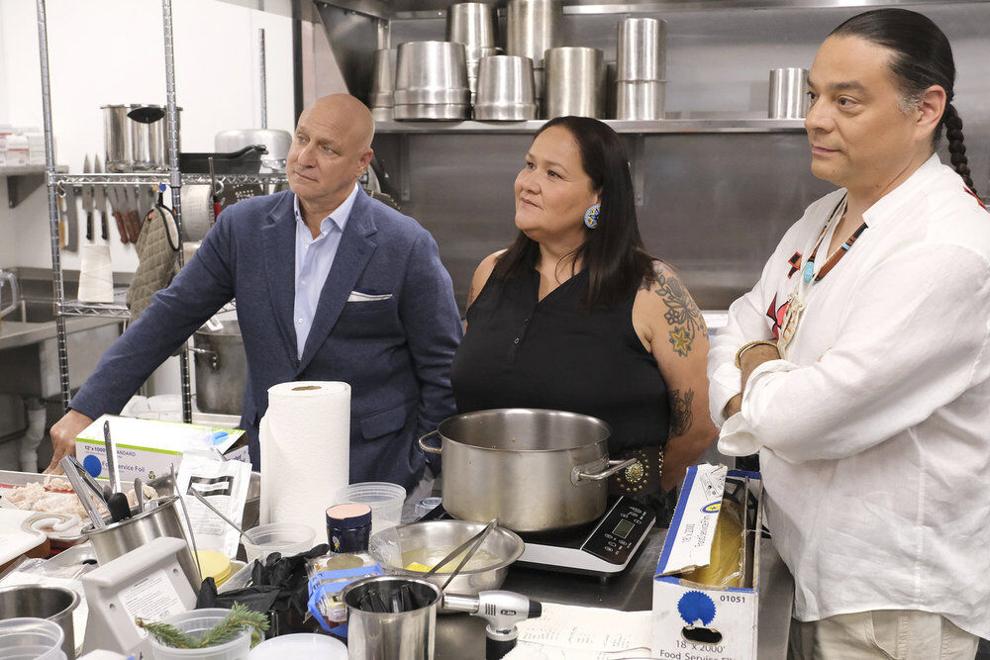
Elena Terry was in Milwaukee … but couldn’t tell anyone why.
Terry, a member of the Ho-Chunk Nation living in Wisconsin Dells, is a chef and founder of Wild Bearies, a nonprofit organization dedicated to providing and educating about Indigenous foods and the culture around those foods.
“Wild Berries really is an indigenous outreach (organization). We like to say more than catering,” she said in an interview for the 365 Amplified podcast last week. “We do it really based on the food sovereignty movement, and what indigenous food as medicine means to us as a community.”
Terry was in Milwaukee last fall to film an episode of the popular Bravo TV show Top Chef – an episode that finally aired on May 15. The cooking competition show, like nearly every reality show, keeps the contents of upcoming episodes closely under wraps, so Terry wasn’t allowed to tell anyone about the episode she was on or what happened in that episode.
The cat almost got out of the bag when she was spotted 100 miles from home.
“There was one person that called me out on social media for being in Milwaukee,” Terry said. “And I had to just kind of be like, ‘I was rendezvousing with my friend from Canada.’” Which, technically, was true – she did meet up with a friend while in Milwaukee to film the episode. But that’s not the reason she was there.
She was in Milwaukee last fall to serve as a mentor and guest judge for the ninth episode of the 21st season of Top Chef.
Listen to the full interview here, or at this link:
“What an honor … when Top Chef calls, of course, I want to be a part of this,” Terry said, noting that she’s watched the show for years with her daughter. “I just have always loved the way that they challenge the chefs… When they approached us with this idea it was a natural, wholehearted yes.”
Terry and Sioux chef Sean Sherman from Minnesota cooked a meal for the eight remaining contestants consisting of items like white bean spread, smoked walleye, masa chips, wild rice patties with rosehip and mushrooms, roasted sweet potatoes, dandelion greens, braised duck, and cedar-braised bison. She and Sherman educated the chefs on the importance of food in Native cultures.
“It was incredible,” Terry said of the experience of cooking for the contestants. “(The producers) said, if you’re willing to do this, we would love to have you make a meal with Sean, who’s a good friend of mine, and feed the contestants and be open to curating a pantry or to having a question session so that they can learn more. That is what I’m all about. I want to celebrate the uniqueness and the beauty of these ingredients and the people behind the work. We can’t have authentic wild rice from the Menominee Nation if people in the Menominee Nation aren’t ricing. How do we help support that and celebrate it? Being able to expose some of the top chefs in the country to these incredibly beautiful and unique ingredients was amazing.”
After that education session, the contestants had to use what they learned to create their own dishes using only ingredients used by Wisconsin’s Indigenous people – that meant no dairy, wheat flour, cane sugar, pork, beef or chicken. The dishes they came up with ranged from roast rabbit with acorn squash polenta cake to duck breast with braised mustard greens to sunflower choke with braised goose.
“We got to come in past the halfway point. We were after Restaurant Wars,” the turning point episode that happens midway through every season, Terry said. “We really got the chefs who are driven, who are transforming their cookery, who are getting inspired on these different levels. They rose to the challenge, and there was not a bad dish served to us.”
Terry said her hour in the national culinary spotlight hasn’t led to a lot of new opportunities – mostly because her slate was already full.
“We have 100% proof of success. Every single one of our culinary apprentices has found full time employment, which kind of leaves me in a tough situation to be saying yes to a lot of things,” she said. “That being said, we have incredible opportunities. We’re going to the Smithsonian Folklife Festival as part of an ongoing partnership that Wild Bearies has developed, and we’re able to bring along three young women who are all studying environmentalism in some form, and advocacy. We’re able to provide opportunities like that, and then kind of take a step aside while we rebuild our culinary mentorship program. It has been work that we’ve been doing in our community.”
Still, the experience had a profound impact on Terry and how she views her work.
“I’m an incredible introvert. I love being in the kitchen, behind the scenes, running the show,” she said. “So putting myself out there like that takes a lot of courage. And in our communities, unfortunately, there’s a lot of lateral criticism, and to be so well received and celebrated. And to say this is a transformative moment to have representation … not only Indigenous, but chefs out there. We’re experts, and we can be heard in these great spaces. It’s representation on so many different levels. How can I not take that moment and take it in? It’s just been incredible for me to be able to feel so strong and grounded from it all.”



